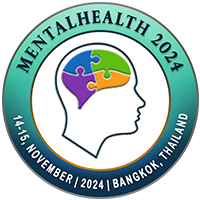
Kadhim Alabady
Dubai Health Authority, UAETitle: Eating Disorders is a Growing Public Health Concern, 2024
Abstract
Background: Eating disorders are a common public health challenge among adolescents, affecting one in six females and one in 40 males. Public health prevention, and interventions are urgently needed as the prevalence of eating disorders (ED) in many countries is still under debate, as well as the impact on the well–being of individuals is not assessed frequently.
Purpose: This assessment forms a rapid eating disorders review, conducted to guide policy–making to related health concerns.
Method: We used in–depth interviewing – a qualitative research technique focusing on different eating disorders.
Participants: The sessions brought together 33 experts including mental Psychiatrists, Psychologists, Dieticians, and Nutritionists.
Setting: It involved conducting 12 separate focus group or in–depth interview sessions.
Key findings:
• Eating disorders can affect people of any age, origin/nationality, gender. They are often diagnosed in teenagers and young adults. Women are considered to be the population most impacted by eating disorders. However, men, boys may experience more barriers to accessing support for eating disorders, and may be less likely to be diagnosed with an eating disorder. It may be hard for men who are experiencing eating disorder symptoms to talk about their behavior.
• The most effective eating disorder prevention measures would be achieved through health promotion approach, focusing on building self–esteem, positive body image, and a balanced approach to nutrition and physical activity.
• There are many factors that may contribute toward an adolescent developing an unhealthy relationship with food and eating patterns. These factors can be one, or a combination of psychological, social, environmental or biological factors that trigger a person with a specific vulnerability.
• Public health awareness campaigns focusing on eating disorders should be able to bring about positive change, need to encourage people feel able to talk about their illness. It needs to ensure that everyone knows how to spot the early symptoms of eating disorders
Biography
Kadhim Alabady, MBBS; MPH; MSc; DrPH; FFPH (UK); FRCP (Glasgow). He is Fellow of the Faculty of Public Health UK (FFPH) and Fellow of the Royal College of Physicians and Surgeons of Glasgow (FRCP – Glasgow). Hold a doctorate degree in public health and epidemiology, Master degree in clinical epidemiology (MSc), Master degree in Public Health (MPH), all from The Netherlands Universities with broad experience driving Research and Development (R&D) strategies and operations. He worked in Public Health since 1999 at different levels such as: Academic (Erasmus university – Rotterdam / The Netherlands, Queen Marry University – London / UK), University of East Anglia UEA / Norwich, International (United Nations), National Health Authority (Qatar), National Health Service (NHS), UK, Dubai Health Authority, others, Registered as Epidemiologist Grade A with The Netherlands Epidemiological Society. Has numerous publications in the UK in mental illnesses, cancer, cardiovascular diseases, diabetes, dementia, autism, COPD, population health, road casualties’ infectious diseases, vaccination, and others

